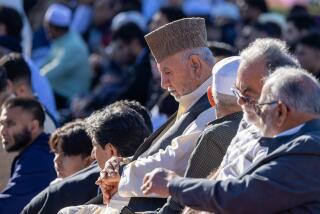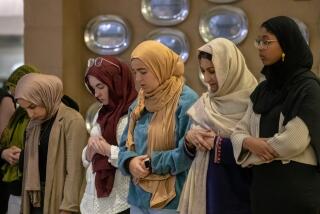Getting a Small Start on Islam’s Fasting Ritual
- Share via
Nine-year-old Danya Maryam Aleem sat among her classmates at New Horizon School-Los Angeles a few days after the start of the holy month of Ramadan. The third- and fourth-graders had just finished praying, and now they began their lesson in Islamic studies with school Principal Shahida Alikhan.
Like 8-year-old classmate Kevin Karidjan, Danya was one of a handful of youngsters who proudly wore stickers on their blue school shirts. Bearing a photo of the holy city of Mecca, the stickers read: “I am fasting.”
During Ramadan, adult Muslims around the world abstain from food, drink and other sensual pleasures from sunup to sundown. But according to Islamic law, no Muslim need fast until he or she reaches puberty. Children are not required to fast, nor are the terminally ill, pregnant women or those traveling long distances.
But Muslim educators such as Alikhan and others believe that Ramadan, the month in which God revealed the Koran to the prophet Muhammad, is an ideal time to give children their first experience of fasting, one of the five pillars of Islam. (The other four are believing in one God; praying five times a day; giving alms each year; and making a pilgrimage to Mecca, Saudi Arabia, at least once in a lifetime.)
A fourth-grader who wears a white head scarf, Danya is proud to be part of the vast global community of Muslims who spend this holy month practicing self-restraint and meditating on the bounty of Allah. She practices fasting from dawn to dusk, but not every day.
Danya, who said “sometimes you get hungry and thirsty,” knows she is readying herself for the day when she will fully participate in the responsibilities and rituals of her faith.
“I need to see how it feels,” she said, about three-fourths of the way through her first full day of fasting. She had not had so much as a sip of water since before sunrise.
Danya said that her teenage sister helped her learn the proper way to fast and that her parents have instructed her in what will be expected of her when she is older.
Fasting, she already knows, is more than eschewing food and drink. It means refraining from bad behavior.
“My father told me if you get mad, it’s halfway to breaking your fast,” she said.
The tradition of gradually introducing Muslim children to fasting is common throughout the Islamic world, according to Sayyid M. Syeed, secretarygeneral of the Islamic Society of North America, based in Plainfield, Ind.
At such campuses as the Islamic Center of Claremont Community School in Claremont and the Al Fatih Academy in the Washington suburb of Herndon, Va., pupils who wish to experience fasting are permitted to try it out.
“They understand something is going on. They ask questions, and then their parents tell them about it,” Syeed said. “We tell them, OK, you can fast half a day, which does not mean anything in terms of the prescribed rules, but this is how they are initiated into the fast.”
Ramadan provides an opportunity to teach children about their faith, said Alikhan at New Horizon-Los Angeles, which has 80 students in grades K-6 at its Koreatown campus and is affiliated with three other Islamic schools in Southern California.
She outlined the school’s philosophy in a letter sent home to parents: “We believe the month of Ramadan is a great opportunity to teach and practice the pillars of our religion,” she wrote. “Hence, our theme of the month will be around fasting.... Although children are not obligated to fast before the age of puberty, we believe this is a good time to practice their fasting and learn good habits.”
The school also sent home a statement from Maher Hathout, spokesman for the Islamic Center of Southern California, which sponsors the schools and shares a Vermont Avenue building with New Horizon-Los Angeles. He reminded parents that the Koran does not require fasting until puberty, although young children might practice it in a limited way.
“However, no child should be compelled or forced to fast. Children should experience fasting in an easy and enjoyable way. For example, a child might feel pride in fasting a few hours.... The most important thing to remember is that fasting should not be a hardship,” he wrote.
Children such as Kevin, a third-grader who has fasted from dawn to sundown during Ramadan since he was in first grade, get positive reinforcement for their decision. Islamic schools are a haven for children who want to practice being observant, in contrast with secular schools, where children who fast may end up being teased.
“They are very excited,” said Alikhan of the youngsters who fast. “First, they get a sticker. Plus, we have special activities planned for those who do not go down to lunch.”
While the other children have their midday meal, prepared according to Muslim dietary laws, Danya and the other children who fast can go to the computer laboratory or the library or play board games.
“They feel happy that they are getting special attention,” Alikhan said.
She and the faculty, almost all fasting themselves, keep a close eye on the young ones, ready to intervene if a child seems weak or unwell.
The children also practice charity, collecting food and toys for the needy during Ramadan, which began Oct. 5 and is expected to end, depending on sightings of the new crescent moon, by Nov. 4 with the Eid al-Fitr holiday.
The youngsters also learn the special prayers and practices of the season, such as iftar, the nightly breaking of the fast. At the school, Friday was expected to be a special night, with New Horizon-Los Angeles faculty, staff, students and their families gathering for an iftar potluck at the Islamic Center. Later, those 8 and older would go to the Islamic Center’s on-site mosque for evening prayer.
A peak of Ramadan is Lailat ul-Qadr, the Night of Power, the anniversary of the night on which Muslims believe the Koran was first revealed to Muhammad.
To celebrate, the Islamic Center of Southern California is sponsoring an evening of prayer Oct. 30 at the Los Angeles Convention Center downtown.
Although Ramadan is a time to read the Koran and practice self-discipline, it is also a celebratory time, especially once the sun goes down.
There are also special parties for young people obligated to fast for the first time; they buy new clothes, celebrate with families and friends, and receive gifts.
Children such as Danya can hardly wait.
Times staff writer Larry B. Stammer contributed to this report.
More to Read
Sign up for Essential California
The most important California stories and recommendations in your inbox every morning.
You may occasionally receive promotional content from the Los Angeles Times.










